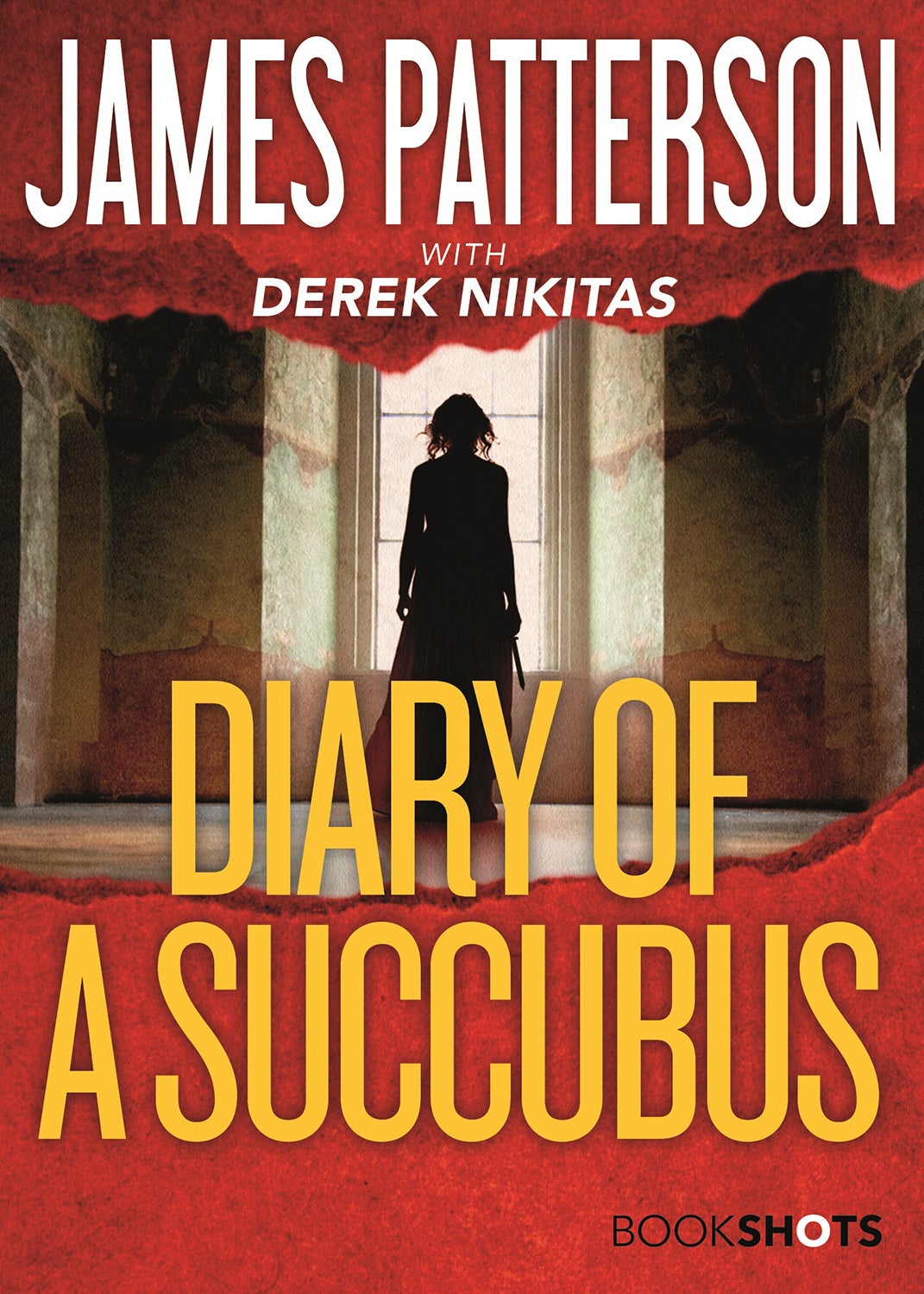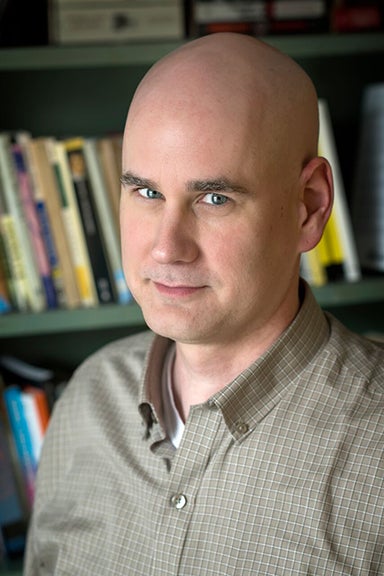KINGSTON, R.I.—April 6, 2017—When Derek Nikitas was a kid, he had a special place in his 10-year-old heart for horror movies—Night of the Living Dead, Creepshow, Frankenstein.
“I was terrified, but I enjoyed the experience,’’ he says. “I liked thinking about the line between what was real and made up. I was fascinated.”
That early obsession with thrillers—on the screen as well as the page—has paid off with the publication of a book co-authored with the planet’s best-selling novelist James Patterson, who has sold more than 300 million books worldwide.
Diary of Succubus was released April 4, and if there’s any doubt that Nikitas, an assistant professor of English and creative writing at the University of Rhode Island, played a key writing role, just take a look at the cover. Nikitas’ name appears just below Patterson’s.
“I’ve had a blast,’’ says Nikitas, 42, of Wakefield. “The best fun I’ve had writing anything. It’s freeing to work with an established writer, with an established voice.”
The 132-page novella is part of Patterson’s e-book series, Bookshots. It’s about a succubus, a supernatural femme fatale who seduces powerful men to infiltrate their evil secret society. Lilly Anna lays out her devilish appeal in the opening paragraph:
“Though sometimes I regret it, I’m everything a man has ever wanted. Point a gun at somebody, he recoils. Slip me in a skintight dress, he leans in. That’s not vanity. It’s just biology, plus a pinch of magic.”
 Patterson is so impressed with Nikitas’ work he also asked him to write another Bookshots novella, You’ve Been Warned—Again, a haunted-house tale set in Rhode Island and based on one of Patterson’s earlier books. That book is scheduled for release in late October.
Patterson is so impressed with Nikitas’ work he also asked him to write another Bookshots novella, You’ve Been Warned—Again, a haunted-house tale set in Rhode Island and based on one of Patterson’s earlier books. That book is scheduled for release in late October.
“Writing for Jim has changed my outlook as a writer,” says Nikitas. “I like to think it will help me in terms of my own readership. It’s exciting.”
As a shy child, Nikitas first started telling stories with action figures he’d set up on the living room floor of his house in Manchester, N.H. By the time he was 10, he was writing stories, mostly thrillers, as a “method of self-expression and connection with people.”
He continued writing in high school—even completing a practice novel—and at the State University of New York, Brockport, where he earned his degree in creative writing in 1997.
He reveled in a community of writers at the University of North Carolina, Wilmington, where he received his master of fine arts, and went on to get his doctorate at Georgia State University. It was there that he finished his first published novel, Pyres, a mystery thriller nominated for an Edgar—as in Allan Poe—Award for best first novel by an American author. His second thriller, The Long Division, was a Washington Post Book World Best Book of 2009.
Nikitas was establishing himself as a writer to watch. After teaching and directing an MFA program for several years at Eastern Kentucky University, he joined URI in 2014.
One morning in 2015, he got an email from a man named Bill Robinson. “I work for James Patterson,” he wrote. “Can we talk?” During a phone call a few hours later, Nikitas’ writing life changed dramatically. Robinson asked Nikitas if he wanted to write a book with Patterson, who recruits talented authors as collaborators. “Sure,” said Nikitas, without any hesitation.
First, he had to pass muster with an audition. Nikitas sent in samples of his work. Robinson responded with an outline for a book called The Murder of Stephen King and asked him to write a few pages using the “Patterson house style”—clear, cinematic and energized with short chapters that each begin with a hook and end with a cliffhanger.
“It’s incredibly difficult to do,” says Nikitas, “even though people assume it’s easy.”
Patterson’s verdict? “Jim loved the pages,” says Nikitas. He bought a bottle of champagne to celebrate his hiring.
“That was the best and also scariest day in my professional writing career,” he says. “Patterson is the best-selling fiction writer in the history of the United States. It was a wonderful feeling to be part of this, but I was also filled with anxiety.”
Three months later, he submitted a 130-page book that he hoped would please Patterson, as well as the story’s subject, Stephen King, the master of horror writing. Although Patterson was delighted with the end result, he eventually had to cancel its publication. In a statement, Patterson explained that he did not want to cause King and his family discomfort with the provocatively titled book.
“I was disappointed, but wanted to honor King,” says Nikitas. “I was understanding of his concerns.”
Undeterred, Nikitas plowed ahead with the two other books, collaborating with Patterson on both. They would talk by phone regularly during the editing. Patterson, he says, was gracious and professional.
“I was intimidated at first, afraid to even make suggestions for the stories,” says Nikitas. “Then, as we got to know each other, a rapport developed.”
More Patterson assignments might be coming the professor’s way this summer. Meanwhile, Nikitas is working on his own projects. He’s written a novelette for Cover Stories, a forthcoming anthology from Volt Books in which contemporary writers re-imagine classic short stories. Nikitas’ contribution is a fresh take on H. P. Lovecraft’s “The Call of Cthulhu.”
Nikitas is also working on Exploiting Tragedy, an original television pilot that is a semi-finalist in the Sundance Episodic Storytelling Lab; a horror/romance movie script with musical interludes; teaching responsibilities, including classes in fiction writing and screenwriting; and a new book of his own—a crime thriller about a high school art teacher who is accused of a violent crime against her students.
Nikitas is right where he wants to be in his life and career.
“I love it here,” he says. “I’ve worked very hard to get to this place in my career, and this kind of teaching position. I’m not going anywhere.”

